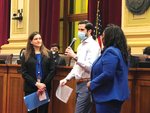


Myalgic encephalomyelitis/chronic fatigue syndrome (ME/CFS) is a multi-system disease that causes dysfunction of neurological, immune, endocrine, and energy metabolism systems. Billy Hanlon, a resident of Fulton, is a dedicated advocate seeking to raise awareness.
“I hope through increased awareness and recognition, that it may help inform, educate, and ultimately inspire others to join our efforts,” Hanlon said.
Hanlon and his fiancée have lived in the Fulton neighborhood since September 2020, having previously lived in Uptown. He graduated from Eagan High School in 2007 and the University of St. Thomas in 2011. Hanlon worked with Ward 13 Council Member Linea Palmisano’s office on the city council designation.
There is no known cure for ME/CFS. With COVID-19, most researchers are now estimating the range of Americans afflicted with ME currently between 5 to 9 million, as a sizable fraction of Long COVID patients are meeting the diagnostic criteria for ME.
Why do you care about this issue?
Hanlon: I am a person living with ME. To be candid, it impacts all spheres of life. An old saying in this community, and one that I would agree with, is that no part of your life goes untouched by the type of disease that ME is.
I hope to use my story with providing awareness and inducing positive change. This disease also thrives on staying in the dark. I’m hopeful bringing it out into the light can only ripple onto others for the better.
Why are you working to raise awareness about ME/CFS?
Hanlon: There are several noticeable gaps for ME patients in the Minnesota healthcare landscape. For educational purposes, there are less than three medical professionals in our state that have a foundational grasp or clinical knowledge on ME. As a result, many of us are disbelieved or discredited in these settings.
Minnesota is such a proud area for medical acumen and I’m advocating to see that translate here with ME and now Long COVID. I’d like to see our state become a more active participant, both in research and clinical care.
What does your advocacy work look like?
Hanlon: I am now a full-time advocate. I have advocated with #MEAction since 2018. #MEAction is a global movement and international network advocating for recognition, education, and research. In hopes that all people with ME will have access to effective care. Part of this work entails outreach and communication to our federal health agencies.
Locally, I recently started my position as the Director of Outreach & Advocacy for the Minnesota ME/CFS Alliance. I have recently begun outreach to our elected officials, local medical provider associations, and the Minnesota Department of Health. I’ve been reminded that so many truly do want to help.
Please share a bit about funding and research needs.
Hanlon: Despite a high disease burden and prevalence, ME has remained one of the lowest funded diseases by the US National Institutes of Health (NIH), the largest biomedical research entity in the world.
Of course, money alone doesn’t solve complex problems or difficult diseases, but it surely helps shape public policy, impacts public perception, helps to stimulate research interest and it expedites progress.
What do you hope comes from a city designation of May 12 as ME/CFS Awareness Day?
Hanlon: First, I just want to say that I was honored to be included at city hall on May 12. I was so grateful for the collaboration with leadership on the ME Resolution. It meant so much to so many. It felt like a watershed moment for ME and Long COVID advocacy here.
I hope we can start the conversation of establishing a Center of Excellence here, just like the CARE for Long COVID Act currently provides language for. This would perform research, carry out interdisciplinary clinical care, and engage with education, training, and outreach.
Illnesses such as these are often considered invisible illnesses. What tips do you offer people dealing with hidden disabilities?
Hanlon: Understandably so, we are a society that tends to emphasize the outside. It’s of my belief that invisible illnesses still deserve every bit of recognition, acknowledgment, and compassion with anything that is visible or easier for us to make sense of.
The nature of these illnesses, exertional diseases like ME and now Long COVID, has made it hard for sufferers historically to campaign. Change takes hard, concentrated effort.
If you would like to help support, you can contact your elected officials with supporting the CARE for Long COVID Act and Treat Long COVID Act, that would help address unmet needs for Long COVID and associated conditions, including ME.
If you’d like to make a monetary or charitable contribution, one outstanding option would be the Open Medicine Foundation.
This tragic pandemic has served as a painful reminder that there’s really nothing more important than our health. You can make a difference today for someone who is fighting for their tomorrow.
1 comment on this item Please log in to comment by clicking here
MinnieHaha
What is important to realize is that people who have this disease cannot and should not be expected to do things like create support groups, lobby, and organize to improve conditions, because they are ill. He is fortunate to be able to do this, as it is demanding. And it doesn't mean he is not ill. Being met with skepticism is demeaning. We should not have to educate everyone we meet. People need to know about this, just as they know about cancer. But most of all, health professionals need to be far better informed and trained, which they generally are not. The medical profession is far behind the research and the true-life experiences of people. Long Covid is finally giving them a clue, but they still don't recognize the connection. The academic core of Medicine, and how students are trained, is where change has to happen. Specialists need to be produced so people can get appropriate treatment. It has been over 40 years since this illness was recognized. And yet it still gets so little recognition or support. No telethons, no major fundraising organizations, no groups of celebrities, save for a few individuals. Medicine must admit it exists, is real, and that they need to do much better. Let Minnesota lead the way, if need be. But think nationally, not locally.
Sunday, July 17, 2022 Report this